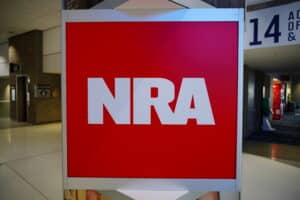The American Civil Liberties Union had harsh words for the National Rifle Association’s mission of “promoting guns,” even as the legal group justified its decision to represent the gun group in its upcoming appeal to the nation’s highest court.
On Monday, the legal group published a lengthy article explaining its view of NRA v. Vullo. The ACLU argued former New York banking official Maria Vullo had tried to compel “private companies to blacklist the NRA” and letting those actions stand risks creating “a loophole in the First Amendment’s protections.” But it also went out of its way to note the ACLU doesn’t support the NRA and even cast Vullo’s motivations in a positive light.
“The ACLU disagrees sharply with the NRA on many issues, yet we are representing the group in this case because of the First Amendment principles at stake,” Jennesa Calvo-Friedman, an ACLU staff attorney, wrote in a post for the group where she also said, “even those who oppose government censorship may be sympathetic to New York’s efforts to shut down the NRA.”
The post underscores just how many strange bedfellows the NRA has made in the course of its litigation against Vullo. In addition to the ACLU, the NRA has garnered at least partial support from President Joe Biden’s Department of Justice.
“The allegations in petitioner’s operative complaint, taken as true, state a plausible claim that respondent violated the First Amendment by coercing regulated entities to terminate their business relationships with petitioner in an effort to suppress petitioner’s advocacy,” Solicitor General Elizabeth Prelogar wrote in an NRA v. Vullo amicus brief.
The broad coalition suggests the gun-rights group, which has shed millions of members and just lost a civil corruption case, is likely to get a win when the Supreme Court sits down to hear this case. But that coalition clearly doesn’t extend beyond the specifics of the First Amendment challenge.
“The NRA is dedicated to promoting guns, which play an outsized role in violence and death in this country,” Calvo-Friedman wrote. “The ACLU does not support the NRA’s mission. In fact, we directly oppose the NRA and support the government’s power to adopt sensible tools, like public carry permits and disarming persons subject to domestic violence protective orders.”
The case stems from actions taken by Vullo, who was the Superintendent of the New York State Department of Financial Services, in the wake of the 2018 Parkland shooting. She wrote a number of companies that did business with the NRA to warn them about the “reputational risk” of continuing those relationships.
“Subject to compliance with applicable laws, the Department encourages its chartered and licensed financial institutions to continue evaluating and managing their risks, including reputational risks, that may arise from their dealings with the NRA or similar gun promotion organizations, if any, as well as continued assessment of compliance with their own codes of social responsibility,” Vullo wrote in the letter. “The Department encourages regulated institutions to review any relationships they have with the NRA or similar gun promotion organizations, and to take prompt actions to managing these risks and promote public health and safety.”
She also cited companies dropping the NRA around that time as an example of good corporate governance.
“There is a fair amount of precedent in the business world where firms have implemented measures in areas such as the environment, healthcare, and civil rights in fulfilling their corporate social responsibility,” she said. “The recent actions of a number of financial institutions that severed their ties with the NRA and have taken other actions after the AR-15 style rifle killed 17 people in the school in Parkland, Florida, is an example of such a precedent.”
The NRA alleged her actions went beyond the public letters, too. It said she also had conversations with the NRA’s insurers, Lloyds of London and Lockton, where she threatened their businesses if they didn’t cut ties with the gun-rights group. Those alleged threats are the ones the ACLU and Department of Justice cite as the most troubling.
“Petitioner has plausibly alleged that at meetings in February 2018, respondent coerced Lloyd’s to end its business relationship with petitioner in an effort to financially harm petitioner because of her disagreement with petitioner’s advocacy,” Prelogar wrote. “At the meetings, respondent allegedly expressed a desire to leverage her authority to financially weaken petitioner based on her disagreement with petitioner’s views, identified technical regulatory infractions that Lloyd’s might have committed, and then stated that she would be willing to overlook those infractions if Lloyd’s stopped doing business with petitioner.”
“Vullo’s threats were expressly based on her disagreement with the NRA’s advocacy. And they worked,” Calvo-Friedman wrote. “Several insurance companies and banks refused to work with the NRA out of fear of reprisals from New York regulators.”
While a lower court judge initially sided with the NRA, a three-judge panel of the Second Circuit Court of Appeals sided with Vullo. The appeals court found her words were persuasive rather than coercive.
“[W]e conclude that the NRA has failed to plausibly allege that Vullo ‘crossed the line ‘between attempts to convince and attempts to coerce,'” the panel wrote. “Moreover, even assuming that Vullo’s actions and statements were somehow coercive, we conclude further that her conduct here–taking actions and making statements in her various capacities as regulator, enforcement official, policymaker, and representative of New York State–did not violate clearly established law.”
In November 2023, the Supreme Court agreed to take up the NRA’s appeal to that decision. Shortly afterward, the ACLU agreed to represent the gun group in that appeal.
Calvo-Friedman argued in her new post on the ACLU website that what Vullo did to the NRA is akin to many infamous attempts by government officials to silence their political opponents, including the actions of Senator Joseph McCarthy in the 1950s.
“The NRA’s case is hardly the first time government officials have sought to use private parties to penalize those with whom they disagree,” she said. “Our nation’s history is replete with examples. And when the government threatens businesses in this way, the businesses often go along. As summed up by a slogan during the McCarthy Era: ‘Why buy yourself a headache?'”
“While it’s understandable that Vullo wanted to address the gun violence epidemic, government censorship wasn’t a constitutional response to the problem,” the ACLU lawyer said.






